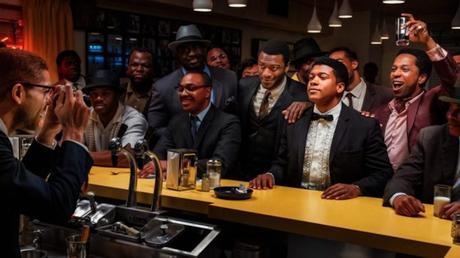

Although the year 2021 is still relatively fresh, we’ve already been treated to a character study of historical proportions. From first-time director Regina King, the Oscar winner focuses on four black men who are at a crossroads in each of their lives; Jim Brown, Cassius Clay, Sam Cooke and Malcolm X. They navigate the implications of their decisions, their personal relationships and how they have to continually fight for respect in the Amazon Original One Night in Miami.
While the film is adapted from a play of the same name, it makes use of a prologue to introduce us to each of the characters. Cassius Clay almost loses a fight when his arrogance catches up to him in the form of a surprise punch from his opponent. We see Sam Cooke bomb in front of a white audience at the famous Copacabana Club and Malcolm X is struggling with his decision to leave the Nation of Islam knowing that doing so could paint a target on himself and his family. Finally, legendary running back Jim Brown returns home to Georgia only to find that in spite of his accomplishments, he is still nothing but a black man to white people. It’s a prologue that reminds of these gentlemen’s place in history and society at the time; Cassius Clay wasn’t yet Muhammad Ali and was largely viewed as arrogant and overconfident, Sam Cooke styled himself as the “King of Soul” but hadn’t found crossover success to white audiences yet, Jim Brown wasn’t a movie star yet and Malcolm X was viewed as militant and controversial for his association with the Nation of Islam. These four men would come together on February 25, 1964 to celebrate Clay’s victory over Sonny Liston to become the world heavyweight champion.
One Night in Miami, like all character studies, is built upon the personal relationships of the each of the characters and each of the men has to navigate the intricacies of these relationships. Starting with Cassius Clay and Malcolm X, Clay had become a Muslim sometime in 1961 but had not yet publicized his relationship with the Nation of Islam while Malcolm X had become a close friend, mentor and advisor to the young boxing champion. Malcolm knows the potential Clay has and wants to do whatever he can to foster that potential while espousing the ideas of Islam but Malcolm has become disillusioned with the Nation as leader Elijah Muhammad has had several extramarital affairs unbeknownst to his congregation. He wishes to leave the Nation and form his own movement that would more closely adhere to the Islamic beliefs he holds dear. This decision angers Clay who has not only decided to make his relationship to the Nation known to the public but has also agreed to change his name to Muhammad Ali and while Malcolm is able to remind the young man of his love and admiration for him, their relationship is fractured.
Malcom also manages to find himself at odds with Sam Cooke, the popular performer who is almost constantly derided by X for pandering to white audiences instead of using his platform and musical talents to write songs similar to the protest songs being released by Bob Dylan or Joan Baez at the time. Cooke drops a bombshell that his label has been promoting black artists and groups and has even optioned his songs that were written by black artists to be covered by white artists and groups to earn massive royalty checks. While this move is applauded, almost sarcastically by X, he reminds that he could be doing so much more than just optioning songs for white people to perform instead of black people. In one of the tensest scenes of the film, X plays Bob Dylan’s “Blowin’ in the Wind”, one of the most famous protest songs of all time, and remarks to Sam that he has never written anything like that. Cooke is torn between the relationship to his friend and his desire to perform and be successful in a world that only sees the color of his skin and not the content of his character. Dylan’s song angers Cooke because, like all great artists, he wished he could have written a song that good and this leads to the most underrated relationship of One Night in Miami.
At the end of their time together, Cooke tells Jim Brown that he has written a song like Dylan’s but that he hasn’t performed it yet. That song would later become “A Change is Gonna Come” which was inspired by Cooke and his band’s real life experience of being turned away from motels that only served white people. Remember, even in 1964, it was still considered unsafe for black people to travel on the roads and to ensure safe travel, The Negro Motorist Green Book was circulated to black travelers to learn of hotels, gas stations and restaurants that were hospitable to black travelers (for more information on the history of the Green Book and its impact, please check out the podcast series Driving the Green Book from Macmillan Podcasts). Cooke even makes reference to the Green Book that one day, it won’t be needed for a black person to safely travel the country. While Cooke is conveying his desire for this song, Jim Brown is listening with rapt attention and is supportive of Cooke and really all of the men in the film. At the time, Brown was 28 years old but was most likely the most mature of the group after Malcolm X. Brown is able to break through Malcolm’s hard exterior and get to the core of why he fights so hard and is able to support Cooke at a moment in his career where he is unsure if he wants to continue catering to white audiences. It’s a great moment between two legendary men and Brown, played convincingly by Aldis Hodge, is able to be the even keel to Ali’s loud proclamations.
Now, at this point in history, Muhammad Ali was on his way to becoming the greatest boxer of all-time following his underdog victory over Sonny Liston. At the same time, Jim Brown had the NFL’s best player for eight seasons. Here some of Brown’s numbers:
- -12,312 rushing yards (number one all-time when he retired)
- -106 rushing touchdowns
- -3-time Most Valuable Player
- -Led the NFL in rushing yards 8 times!
Brown is still considered to be one of the greatest players to ever play in the NFL but at the time, his love of the game was waning and a new passion was beginning to take hold, that of becoming a movie star. In 1964, Brown had starred in the western film Rio Conchos and while Brown was proud to be in the film, Ali laughed at him upon learning that his character is killed roughly halfway through the film and even remarks that a black action star is something that may never happen in Hollywood. If it were anyone else saying this to Brown, he might have gotten physical with them but Brown literally had no equals in terms of physical strength and accomplishments. While Ali didn’t have the accomplishments yet, like X, Jim is able to recognize the young man’s potential and reminds him that his victory is only the beginning and he will only go as far as he wants to go.
The film is summed in the briefest of historical terms; Sam Cooke performs “A Change is Gonna Come” on The Tonight Show, Jim Brown would announce his retirement from the NFL on the set of The Dirty Dozen, Muhammad Ali would publicly embrace the Nation of Islam and go on to become the Greatest and the most of these is Malcolm X, whose home is fire bombed and begins to realize that his life may be coming to an end soon. He’s able to publish his autobiography before his assassination on February 21, 1965. Speculation persists to this day as to whether his assassination was orchestrated by the Nation of Islam with the help of the government but that’s outside the scope of this review. These were all great men who lived impactful lives and are recognized as some of the most influential men of the 20th Century.
While One Night in Miami glosses over some of the less favorable aspects of these men (Sam Cooke’s philandering, Jim Brown’s legal troubles, Malcolm X’s comments regarding the assassination of JFK and Ali’s accusations of dodging the Vietnam War), it manages to retain the spirit and drive of these men and captures them in an unique moment in each of their lives. The cast of the film is spectacular with Kingsley-Ben Adir, Eli Goree, Leslie Odom, Jr and Aldis Hodge deserving every type of accolade that can be bestowed on their performances. Their chemistry is fantastic and the film feels bigger than the tiny Miami hotel room they occupy for an evening.
VERDICT: 4.5 fancy German cameras
For more film reviews from Chris Rupp, check out here.
Featured Image Credit: One Night in Miami on Amazon
